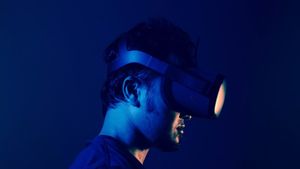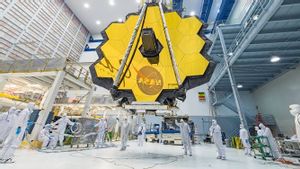JAKARTA – Following the announcement that parent company Facebook will be rebranding in its shift towards the Metaverse, many projects have embarked on similar initiatives into the virtual space. The project ranges from buying property to testing the limits of what the universe has to offer.
Disneyland, the entertainment company behind some of the world's most popular theme parks, recently had an approved patent for a "virtual simulator in a real-world setting." Although the Los Angeles Times reports that Disney has "no current plans" for using the simulator in the near future, the app suggests Disneyland and Disney World guests may eventually see Metaverse attractions at one or more parks in the United States, Hong Kong, China, France, and Japan.
The technology will work by tracking visitors using their mobile phones and generating and projecting personalized 3D effects onto nearby physical spaces, such as walls and other objects in the park.
According to the patent application, Disney's possible foray into the Metaverse could "provide users with a realistic and highly immersive individual 3D virtual experience without requiring the user to use an augmented reality AR display device."
On Monday, January 10, concert organizer Metaverse Animal Concerts announced it had signed a deal with Klaytn network, South Korean unicorn Kakao as part of a plan to increase its exposure to the country's entertainment industry. Animal Concerts CEO Colin Fitzpatrick said that "Klaytn's main goal is NFT and Metaverse."
“Technical limitations prohibit how many people can actually attend a concert on the Metaverse,” Fitzpatrick said, referring to scalability issues. He aims to build a network of virtual venues across the existing and new Metaverse platforms to host concerts with a wide range of talent, apparently including K-pop artists.
SEE ALSO:
Linden Lab, the company behind Second Life's virtual online world, also announced on Thursday 13 January that co-founder Philip Rosedale will rejoin the project as a strategic advisor along with members of the Metaverse team of San Francisco-based VR company High. Fidelity. According to the company, the addition of new and old talent will facilitate Second Life's entry into the Metaverse.
“The virtual world doesn't need to be dystopia,” said Rosedale, as quoted by Cointelegraph. “Big Tech giving away VR headsets and building a metaverse on an ad-driven behavior modification platform won't create a single magical digital utopia for everyone.”
Launched in 2003, Second Life was one of the earliest virtual experiences before the connectivity of modern social media platforms such as Facebook, Twitter, and Instagram.
Rosedale departed as CEO of Linden Labs in 2008 before going on to co-found High Fidelity in 2013. His return could mark a significant milestone for incorporating new Metaverse-themed ideas into an already established platform.
The English, Chinese, Japanese, Arabic, and French versions are automatically generated by the AI. So there may still be inaccuracies in translating, please always see Indonesian as our main language. (system supported by DigitalSiber.id)













